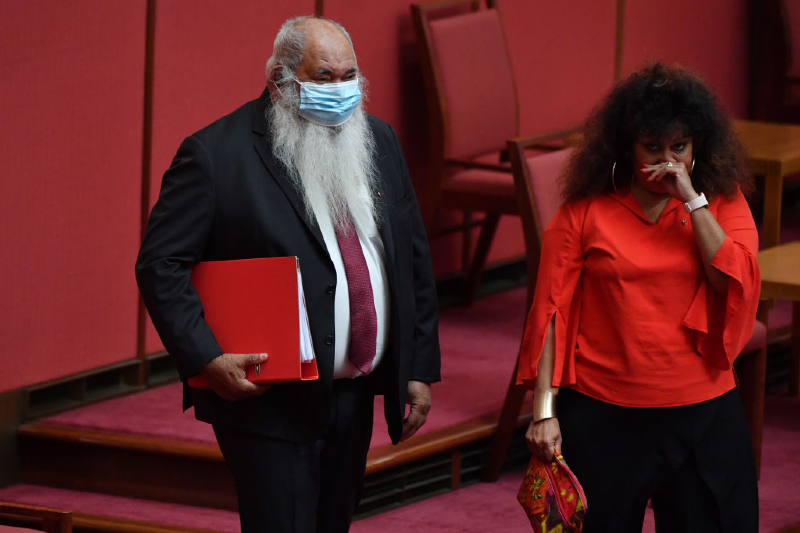Extract from Eureka Street
- Michele Madigan
- 03 December 2020
Late last month, with a cheery, ‘I’ll get that in the post to you this afternoon’, the administration official promised to send the hard copy of the Inquiry into the Social Security (Administration) Amendment (Continuation of Cashless Welfare) Bill 2020.

What is contained in the document of course is anything but cheery to those for whom the legislation is intended. It’s the latest push of the federal government to make permanent that which their rulers believe is best for the lower classes, in particular, the First Nations lower classes.
I guess it’s an aside but it seems puzzling that the adherents of opposition to state control of public services like our railways and telecommunications, at the other extreme are nevertheless proponents of minute state control of day-to-day affairs of individual citizens in the system of Income Management (IM).
Surely it’s shameful to the rest of us in our nation that we keep heaping burdens on those whose life is already so burdensome. As a Ceduna SA Aboriginal person framed the whole of the Income Management scheme: ‘We’re starting to feel like we’re back in the ration days when white people managed our lives and everything else and treated us like children. It’s the same now. We’re treated like children and so we can’t make decisions for ourselves. We’re moving backwards, not forwards.’
The stages so far of Australia’s IM regime stretch from 2007 under both Coalition and Labor governments.
Stage one was BasicCards for over 25,000 people originally as part of the Northern Territory Intervention. Stage two was BasicCards for the six chosen nationwide ‘Other Areas’. Stage three was Cashless Cards to the Ceduna region that is Ceduna/ Yalata Aboriginal Aboriginal Community/ Oak Valley Aboriginal Community (Maralinga Lands) and to the East Kimberley region. Later to the WA Goldfields and lastly Bundaberg Qu. All areas with high percentages of Aboriginal and Torres Strait Islander peoples. Stage 4 is the present CDC bill, which as the Greens dissenting report well summarises: ‘seeks to permanently entrench compulsory income management in the form of the Cashless Debit Card (CDC) as part of Australia’s social security system.’
'Both First Nations Senators are the signatories on Labor's Dissenting Report to the current bill. There is much to dissent about.'
Reading the government controlled Senate Committee recommendations regarding the current bill and then the dissenting reports is like reading about two parallel universes. In the former, the emphasis, while quoting various submissions, including from the some thirteen major submitting Aboriginal organisations, seems focussed primarily on fixing the technical problems of the process raised. This is not the point!
There are, as well, a few glowing reports of individual Aboriginal people made-good under present Income Management schemes. No mystery there however when footnotes reveal a number of these were from the Minderoo Foundation of billionaire miner Andrew Forrest. This is the man on whose recommendation to the Abbott government, the whole scheme of the already established BasicsCards of Stage 1 was moved along to Stages 2 and 3 of Cashless Cards in other Australian jurisdictions.
In contrast, the comments of people on IM given voice in our Josephite SA Reconciliation Circle submission, make shameful reading. Firstly, there’s the inconvenience and waste, the frustration of the interference:
‘If you’ve got cash you can make better choices and get second-hand things instead of brand new expensive things. We used to be able to save more money when we had more cash and could buy more cheaply.’
‘There’s no cash money for going on ceremony for cultural business. We need food and other things for that, but we can’t pay for these things without cash.’
‘Because people are desperate, some people have been swopping the Cards for cash. Once they’ve used up their cash amount and are desperate for more cash, they sell their Card to someone for cash that’s less than the value on the Card.’
Then there’s the inequality:
‘We want to make our own choices and not be treated like children.’
‘This is another way of government controlling Aboriginal people; controlling their economic circumstances.’
‘The Card’s no good and it doesn’t help. It’s degrading us down and people have no hope.They feel hopeless. They’re not happy. They’re stressed because of the Card.’
It’s obvious with the addition to Labor’s ranks of Aboriginal Parliamentarians, including the Territorian Senator Malarndirri McCarthy and Broome based Senator Pat Dodson, that understanding of First Nations issues has undergone that required shift from the Rudd/Gillard era, which included the astonishing ten year extension to the NT Intervention including the BasicsCard.
Both First Nations Senators are the signatories on Labor’s Dissenting Report to the current Bill. There is much to dissent about. They quote Aboriginal Peak Organisations NT summary: ‘Our perspective on the cashless debit card, from the enormous consultation we’ve had with Aboriginal and Torres Strait Islander communities, is that they don’t want it, hence we are calling on the Senate not to support this bill.’
In particular, 1.19 of Labor’s report notes, ‘Labor Senators are also incredibly disappointed that the Government’s insistence on this bill is counter to the Prime Minister’s partnership approach to Closing the Gap.’ Professor John Altman’s submission adds ‘with the ink hardly dry on the paper.’
'Once again, with Labor and the Greens opposing another federal bill attempting to be rushed through at this December stage of the year — before already commissioned evidence is publicly released — the CDC’s bill fate depends on the other five crossbench Senators.'
Regarding the government budget for these proposed changes to NT Communities (as well as a different scheme of things for Cape York not discussed here), once again money appears to be no object. $12.3m is named but just for support services. One can only imagine the actual costs of production and delivery — as the Greens note, conveniently unrevealed as ‘commercial in confidence’ agreements to Indue and other private companies.
Aboriginal and Torres Strait Islanders currently make up 3.3 per cent of Australia’s population. No surprise to anyone knowing the history of these last thirteen years of government concerning Income Management in Australia is the concluding sentence of Senators McCarthy and Dodson in Labor’s dissenting report: ‘Around 68 per cent of the people impacted by the restrictions and controls of this bill are First Nations Australians. Labor Senators believe this makes the bill racially discriminatory.’
Once again, with Labor and the Greens opposing another federal bill attempting to be rushed through at this December stage of the year — before already commissioned evidence is publicly released — the CDC’s bill fate depends on the other five crossbench Senators.
What is the solution? Many of the submitting thirteen key Aboriginal organisations including the Aboriginal Peak Oganisations NT offered many solutions based on genuine consultation with people. On 28th November another Parliamentarian, the NT’s Yingiya Mark Guyala MLA summarised: ‘...We say Yaka Cashless Card for the NT! … What we need is action on remote housing, culturally relevant education and better resourcing for economic opportunities on country — not more Intervention style policy from Canberra or Darwin that doesn’t include us in the conversation. Give us real Self-Determination!’
 Michele
Madigan is a Sister of St Joseph who has spent over 40 years working
with Aboriginal people in remote areas of SA, in Adelaide and in country
SA. Her work has included advocacy and support for senior Aboriginal
women of Coober Pedy in their successful 1998-2004 campaign against the
proposed national radioactive dump.
Michele
Madigan is a Sister of St Joseph who has spent over 40 years working
with Aboriginal people in remote areas of SA, in Adelaide and in country
SA. Her work has included advocacy and support for senior Aboriginal
women of Coober Pedy in their successful 1998-2004 campaign against the
proposed national radioactive dump.
No comments:
Post a Comment